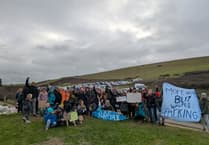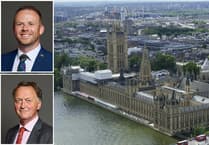A PLANE is flying low over Cornwall mapping its geology, natural resources and environment as part of a survey of the South West.
The British Geological Survey's Tellus SW survey has seen the twin turbo-prop Reims Cessna F406 flying at 80m above ground over open countryside and 250m or higher over towns and tall buildings in long north to south sweeps that Tellus project manager Dr Andrew Howard likens to 'lawnmower strips'.
The survey started in West Cornwall and has been gradually travelling east. Coverage of the county is now nearing completion, having reached the outskirts of Launceston.
Dr Howard said the aircraft will be flying over Launceston next week and then up to the North Devon coast at Clovelly and Bideford before turning over the sea and heading south over the Tamar Valley, to reach Whitsand Bay on South East Cornwall's coastline.
When the project moves on to the Plymouth area, more than 60 fly-pasts at 250m above the ground will be required to take in the whole city area plus the neighbouring Cornish towns of Saltash and Torpoint, so it is likely the plane's activities will be very noticeable to people in that area.
Dr Howard said the survey had so far been blessed with favourable weather, so was currently ahead of schedule, although on some mornings flights had had to start a little later than expected due to early morning mist.
The South West survey is due to finish in the area just west of Exeter in early November but, provided weather conditions over the heights of Dartmoor do not cause delays, it may well be finished by late October.
Dr Howard said that before the results are published, a lot of work will be required by experts on computers to remove manmade anomalies, such as buildings, pylons, mines and even passing vessels and shipwrecks out at sea, whose magnetic fields may otherwise affect the final mapping.
When this is complete, the survey will give a comprehensive, three-dimensional picture of the underground environment, to depths of many hundreds of metres, which will help manage natural resources and the environment. The data will be compiled into maps which will be made freely available online.
The project is being paid for by the Natural Environment Research Council and is being managed by a partnership of the Natural Environment Research Council, the British Geological Survey, the British Antarctic Survey and the Centre for Ecology and Hydrology working with the University of Exeter Camborne School of Mines.
If you want to know when the plane will fly over your area, call the Tellus SW information line on 01752 931009.
.jpg?width=209&height=140&crop=209:145,smart&quality=75)



Comments
This article has no comments yet. Be the first to leave a comment.